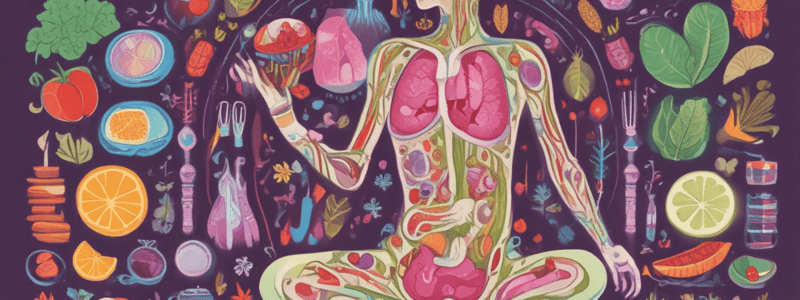Podcast
Questions and Answers
Where does fat digestion primarily occur?
Where does fat digestion primarily occur?
- Mouth
- Large intestine
- Small intestine (correct)
- Stomach
What is the primary function of carbohydrates in the body?
What is the primary function of carbohydrates in the body?
- To provide energy (correct)
- To regulate body temperature
- To build and repair tissues
- To support immune function
What is the purpose of portion control?
What is the purpose of portion control?
- To decrease food waste
- To increase nutrient intake
- To maintain a healthy weight (correct)
- To reduce cooking time
Which type of fish should pregnant individuals avoid due to high mercury levels?
Which type of fish should pregnant individuals avoid due to high mercury levels?
What is the purpose of artificial sweeteners in a post-vertical gastric sleeve patient?
What is the purpose of artificial sweeteners in a post-vertical gastric sleeve patient?
Study Notes
Functions of Fats in the Body
- Fats serve as a source of energy and provide ATP (adenosine triphosphate) for the body's functions
- Fats are structural components of cells, making up the phospholipid bilayer of cell membranes
- Fats act as a cushion for organs and provide insulation to maintain body temperature
- Fats are essential for the absorption of fat-soluble vitamins (A, D, E, and K)
Pathophysiology of Fat Digestion
- Fat digestion occurs primarily in the small intestine
- Bile salts from the liver and gallbladder emulsify fats into smaller droplets
- Pancreatic lipase breaks down triglycerides into fatty acids and glycerol
- Fatty acids are absorbed into the bloodstream and transported to the liver for processing
Portion Control
- Eating appropriate amounts of food to maintain a healthy weight and prevent overeating
- Paying attention to hunger and fullness cues to stop eating when satisfied
- Controlling food portions by using smaller plates, measuring cups, and eating slowly
- Aiming for 3-4 main meals and 2-3 snacks per day, with balanced macronutrients and fiber
Carbohydrate Digestion and Absorption
- Carbohydrate digestion occurs primarily in the small intestine
- Salivary amylase breaks down carbohydrates into maltose
- Pancreatic amylase breaks down carbohydrates into simple sugars (glucose, fructose, and galactose)
- Simple sugars are absorbed into the bloodstream and transported to the liver for processing
Primary Function of Carbohydrates
- Providing energy for the body's functions
- Functioning as the primary source of energy for the brain and nervous system
Artificial Sweeteners
- Artificial sweeteners are low-calorie alternatives to sugar
- They can be used to reduce sugar intake and manage blood sugar levels
- However, artificial sweeteners can be detrimental to gut health and alter the gut microbiome
- As a gastric sleeve patient, it is essential to choose artificial sweeteners that are low in sugar and do not trigger cravings
Mercury in Fish
- Mercury is a toxic substance that accumulates in fish and shellfish
- Pregnant individuals should avoid high-mercury fish to prevent fetal exposure
- Fish to avoid include:
- Shark
- Swordfish
- King Mackerel
- Tilefish
- Marlin
- Barracuda
- Low-mercury fish options include:
- Salmon
- Sardines
- Anchovies
- Trout
- Cod
Studying That Suits You
Use AI to generate personalized quizzes and flashcards to suit your learning preferences.
Description
Test your knowledge of nutrition and digestion! This quiz covers the functions of fat in the body, the pathophysiology of fat digestion, portion control, and the role of carbohydrates. It also touches on the use of artificial sweeteners. See how well you understand these important health topics!




